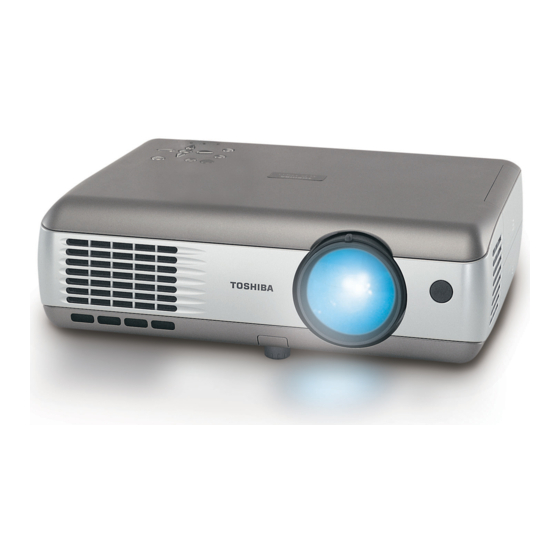Toshiba T620 Manuel du propriétaire - Page 26
Parcourez en ligne ou téléchargez le pdf Manuel du propriétaire pour {nom_de_la_catégorie} Toshiba T620. Toshiba T620 37 pages. 3lcd data projector

Using the document camera (Continued)
r Select the projector on which the images
were temporarily saved in step
A list of the MAC addresses of the wireless
LAN PC cards
p.32
,
p.60
mounted on the
projectors that are available for communication
appears. (If projector name has been set up
already, it is shown instead of the MAC
address.) Select the desired projector from this
list.
Then icon
is displayed on the projector's
screen for few seconds.
t Click on the
button.
If Open a file was selected in step e
Open the JPEG file sent from the projector, and display it on the computer. The
software application linked to the jpg extension on that computer displays the file.
If Save to Disk was selected in step e
A dialog box appears, prompting you to select a location in which to save the
JPEG file sent from the projector. Specify a file name in this dialog box to save the
file.
To view or save another image from the camera, repeat w and e of step
2
3
, and t of step
as many times as necessary.
Notes
• Only one image can be saved on this projector temporarily at a time. If another image is
saved, the current one is overwritten.
• Any adjustments other than CAMERA GAIN (+/–) and Sharpness will not be reflected
on the forwarded image.
• It is not possible to photograph resized or frozen images.
• The size of the saved file will vary, depending on the image.
2
.
50
I Storing the camera images into the memory PC card
Models equipped with a PC card slot are able to save image data taken with the
document camera onto a memory PC card (sold separately) in JPEG format.
1
Mount a memory PC card into the PC card slot
Mounting a PC card will switch to PC card input if Input select mode is set to Auto on
the PC card setting menu
p.55
. In this case, press the CAMERA button on the
Camera control panel to switch to camera input.
2
Display the camera image, and press the STORE
IMAGE button.
A message appears on the screen, confirming that you wish to
save the image.
3
Press the
buttons to save the image.
(To not save the image, use the
Data save to the memory PC card begins.
The
icon will appear on the upper left of the screen during saving.
Never remove the memory PC card during a save. Doing so could corrupt your
data, or damage the PC card.
When the writing is complete, the icon disappears and a message appears informing
you that saving is complete, then disappears after a few seconds.
Repeat step
2 3
as necessary to store more images.
4
Check the saved file, if necessary.
Use the steps in "Projecting images stored in a memory PC card"
contents of the file or image. Images are saved in the memory PC card's _doccam
folder in JPEG format. If there is no _doccam folder, the images are created in the
memory PC card's root directory.
Notes
• Any adjustments other than CAMERA GAIN (+/–) and Sharpness will not be reflected
on a JPEG file saved on the memory PC card.
• It is not possible to photograph resized or frozen images.
• Saved files are saved with names in the range of pix001.jpg to pix999.jpg. If there is
already a file named pix999.jpg, no more files can be saved.
• The size of the file will vary, depending on the image. The number of files that can be
saved depends on the size of the files and the capacity of the memory PC card.
• Do not mount a write-protected memory PC card into the projector. It may become
impossible to access the memory PC card.
(Models equipped with PC card slot)
.
p.23
W.BALANCE
OVERLAY
LOCK
STORE
CAMERA
IMAGE
GAIN
buttons to select No, then press the
button.)
p.42
to check the
51
ARM LIGHT
CAMERA
